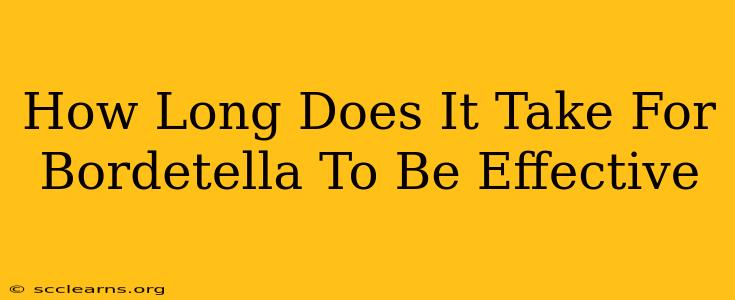Bordetella vaccines, protecting against the Bordetella bronchiseptica bacteria, are crucial for the health of many animals, especially dogs and cats. But how long does it take for this protection to kick in? Let's explore the timeframe for effective immunity and what factors influence it.
The Timing of Bordetella Vaccine Effectiveness
The time it takes for a Bordetella vaccine to become fully effective varies slightly depending on the type of vaccine administered (intranasal vs. injectable) and the animal's individual immune response. However, a general guideline is that full immunity typically develops within approximately 2 weeks after vaccination.
Intranasal Vaccines: A Closer Look
Intranasal vaccines, administered directly into the nose, generally offer a slightly quicker onset of immunity compared to injectable vaccines. This is because they stimulate an immune response directly at the site of infection (the respiratory tract), mimicking a natural infection. While you might see some level of protection sooner, aim for the full 2-week period for optimal protection.
Injectable Vaccines: Understanding the Process
Injectable vaccines, while potentially taking a bit longer to reach full effectiveness, provide a strong, systemic immune response. The body takes time to process the vaccine and build sufficient antibodies. Again, plan for that 2-week window before assuming full protection.
Factors Affecting Vaccine Effectiveness
Several factors can influence how quickly and effectively a Bordetella vaccine works:
Animal's Age and Health:
- Puppies and Kittens: Younger animals may have a less mature immune system, potentially leading to a slightly slower immune response.
- Underlying Health Conditions: Animals with compromised immune systems due to illness or medication may take longer to develop full immunity.
Vaccine Type and Quality:
- Vaccine Formulation: Different vaccine formulations can have varying efficacy and timelines for immunity development. Consult your veterinarian about the specific vaccine used and its expected protection timeline.
- Storage and Handling: Improper storage or handling of the vaccine can impact its effectiveness. Trust your vet to ensure proper vaccine handling.
Booster Shots: Maintaining Long-Term Protection
While the initial Bordetella vaccine provides protection within a couple of weeks, booster shots are essential for maintaining long-term immunity. Your vet will advise on the appropriate booster schedule based on your pet's individual needs and the specific vaccine used. This schedule varies greatly depending on the vaccine type and your pet's lifestyle (e.g., boarding, dog parks).
When to Consult Your Veterinarian
If you have any concerns about your pet's response to the Bordetella vaccine, or if you notice any unusual symptoms after vaccination, contact your veterinarian immediately. Early detection and intervention are crucial for maintaining your pet's health and well-being. They can assess your pet's individual situation and provide the best course of action.
Remember: This information is for general knowledge and shouldn't replace advice from your veterinarian. They can provide tailored recommendations for your pet based on its specific health history and lifestyle. Always consult your vet for the best guidance on your animal's healthcare needs.

